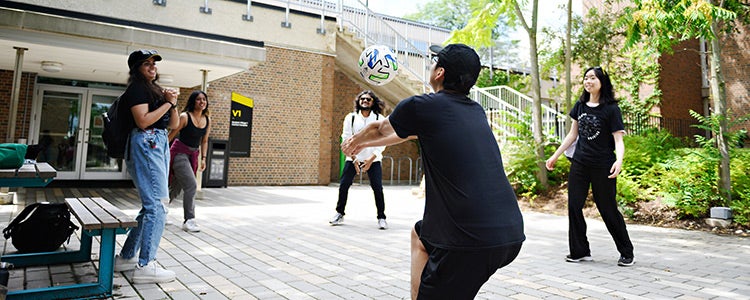
Written by Zahra (she/her), student
When you’re deciding where to go for university, you may have to leave your hometown, which could make it difficult or even impossible to continue living at home.
In that case, you’ll have to choose one of three routes, which all come with their own pros and cons. I’m going to try and break it down for you below.
Living in residence
This is a popular option! Eight out of ten first-year students choose to live in residence. At Waterloo, first-year students are guaranteed a spot, so there’s no extra headache to find somewhere to live. Also, it’s a great way to meet new people and integrate into university life.
Pros
- You’ll make new friends quickly and get to participate in fun residence events.
- You can roll out of bed 10 minutes before class.
- You can choose your own roommate and have a familiar face to go through first year with.
- You won’t need to do a lot of cooking, grocery shopping, or other chores. Residences have cafeterias and cleaning staff!
- You’ll have easy access to on-campus resources.
- Residence fees are all-inclusive and paid just like your tuition. This one-time fee makes it easy, and there are no additional or hidden costs.
Cons
- Living on campus isn’t as cheap as living at home rent-free. It may cost you upfront, but consider the value you’re getting for your money.
- Moving away from home for the first time can be daunting, but in our residences, you're not alone. Everyone in first year is navigating new relationships with suite and floormates and these groups are largely successful as everyone shows up in the fall with an open mind and the goal to have a great year. Also, there are lots of staff you can connect with to step in and help you.

Staying at home and commuting
A lot of people do this for a variety of different reasons. Many people say it saves money, which is true, but it also makes the transition to university much less jarring for both students and their parents. Either way though, commuting could cost you.
Pros
- It could be absolutely free if your kind parent or someone else drops you off at the school for no cost.
- You won’t have to cook or do chores (any more than you already were, of course).
- You don’t have to move out and move in somewhere else (save packing and unpacking!).
Cons
- You may have to pay for public transit or Ubers. Waiting for public transit can be inconvenient, and Ubers are expensive!
- Studies have shown that students who begin their first year in residence have a higher GPA than those who don't.
- If you decide to drive yourself, you’ll pay for gas, maintenance, insurance, repairs, and parking.
- You’ll waste time commuting back and forth every day (instead of studying, working, or hanging with friends).
- You’ll live further from your new friends.
My experience living at home
In my first year, I did a combination of living at home and living off campus, which isn’t necessarily a very common option. It made sense for me though because my family is from Waterloo and the money I saved allowed me to purchase a vehicle to drive myself to campus (and beyond!)
And guess what? I not only survived but also made lots of friends, did well in school, and got involved with extracurriculars along the way. Honestly, your university experience is what you make of it.

Living off campus
This is an alternative to the other two options above. If you already know people who are going to the same school as you, or if you already live in the city of the university you’ll be going to, it can make it easier to find roommates and a place to live.
However, it can take a lot of organization. Also, it can be a big transition to go from living with your parents to living on your own while also attending your first university classes.
Pros
- Take advantage of the large variety of housing options to find something that fits your lifestyle.
- You can still be close to campus and have access to the same campus services and supports.
- You’ll likely save money, because it’s usually cheaper than living in residence and buying a meal plan.
- You can pick your roommates and living arrangements.
Cons
- It can be hard to find a place and roommates and get everyone to sign leases before you’ve even started school.
- You’ll have to do all your own cooking and cleaning.
- Depending on your lifestyle and landlord, beware of hidden fees or unexpected charges, e.g., large utility bills, deposits, maintenance if something breaks, food, apartment furnishings, and your commute.
- Most leases are a minimum of one year. If you don't plan to be there for the full year (e.g., you have your summers off and want to go back home or you are on a co-op term in another city), you might choose to arrange a sublet (which is added work) or you may end up paying for a place you aren't living in.
- Over 80% of incoming first-years live in residence. Students who live off campus miss out on the academic and social programming that residence offers.
Getting involved with the off-campus community
If you’re living off campus, here are some insider tips and tricks to help you make your university experience the best it can be.
Get active
Get involved in sports and recreation by playing on an intramural team (they have beginner, semi-competitive, competitive, and women’s-only options), work out at one of five gyms on campus (there are classes, or you can do your own thing), or even join one of Waterloo’s 33 varsity sports teams.
As a student, you get access to all gyms on campus, so you might as well make use of it — and use those new headphones you’ve been wanting to flex.
Get involved
Find a club or group that has the same interests or hobbies as you — it’s part of Waterloo’s culture to learn new things and grow from shared experiences.
If you need some inspiration, visit WUSA (Waterloo Undergraduate Student Association). They have everything from shopping, nails, cheese, and dance to chess clubs... so there’s definitely something in there to spark your interest.
Use Waterloo's off-campus housing resources
Just because you don’t live on campus doesn’t mean you aren’t going to be supported from an academic, wellness, and social perspective.
Waterloo can even help you find off-campus housing and can explain what to expect from homeowners when it comes to signing your leases.
Visit the off-campus housing page for listings, lease reviews, and search strategies, or contact the Housing Office to speak with a housing advisor for assistance.
Get started right away
WUSA offers support for off-campus students, including events during Orientation (your first week on campus as a Waterloo student).
Visit the off-campus community page for more details on how to get involved and how to get in touch with fellow off-campus students, including dons (residence ambassadors that help you transition from high school to university). Also, remember to go to the university’s off-campus housing page to learn more about your options in Waterloo.
Don't skip out on events
The university hosts plenty of fun events, from Orientation (in your first year) and Welcome Week (for everyone at the start of every term) to free massages and even bingo.
When it comes to events, trust me when I say you’ll be glad you stayed for an extra hour or so instead of starting your commute back home. You’ll have a lot of fun and meet lots of people — and possibly even score free stuff, which is always a plus.

Savour the fine culinary delights of campus
By that I mean that you should try some of the food on campus and have dinner with your friends. There are definitely some hidden gems like
- ML’s Diner in Modern Language’s basement where you can grab a Warrior burger with fries/poutine for dinner;
- South Side Marketplace in South Campus Hall, which has some tasty Lebanese cuisine (yes, that includes shawarma); and
- Liquid Assets Café in Hagey Hall, which is famous for their daily soups and grilled melts. Yum.
Are you an international student? We've got you covered
It can be hard enough living on your own, but to do that when you’re also trying to adjust to a whole new country, well, that can be a whole new challenge. That’s why Waterloo has resources for students that aren’t coming from a Canadian high school, including their very own international student guide.
Related articles

Your guide to Living Learning Communities
Simply put, a Living Learning Community (LLC) brings together first-year students from the same program or faculty to live together in residence and benefit from extra programming.

What it’s like to live in residence
You’ve probably heard many different opinions about living in residence. Likely some good, some bad, some true, and some not so much. But take it from me and five other Warriors as we give you the inside scoop on what it's really like to live in residence at Waterloo.

What are the different residences at Waterloo?
With so many residences available to you, knowing which one will best meet your needs can be a bit tricky. But you're in luck! Here’s the rundown on each residence at Waterloo to help you differentiate them and figure out the right place for you.

